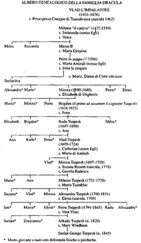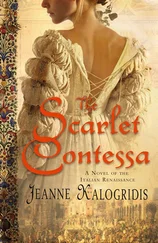“The rebels won’t let me go,” I said. “They want me dead.”
One of his black brows lifted slyly. “The rebels want a secure republic, which they do not have. They need the goodwill of King François, and they will not have it until they show proper respect to his kinswoman.” He bowed again, suddenly. “I shall not linger, Duchessa —if there is plague in this building, I must move all the more swiftly. Give me a few hours, and we will take you to a home that is more suitable.”
He began to move away; I called out, “Please tell my aunt Clarice how grateful I am that you have come!”
He stopped and faced me, his expression quizzical. “I have not been in contact with her, though I will certainly try to send her your message.”
“But who sent you?”
“An old friend of your family alerted me,” he said. “He said that you would know it was he. Ruggieri, I believe his name was.” He paused. “Let me go now, Duchessa, for the plague moves swiftly. I swear before God, you will not spend another night here. So be of good cheer and brave heart.”
“I will,” I said, but the instant he disappeared down the corridor, I burst into tears. I cried because Ser Cosimo, a near stranger, had found me and taken pity; I cried because Aunt Clarice had not. I picked up the abandoned square of spiderweb-fine lace to wipe my eyes, and inhaled the scent of flowers.
I told myself that the Raven’s Wing would protect me from plague and see me freed from Santa-Caterina; I vowed never to let it go again.
But the French ambassador did not come for me that morning, nor did anyone come for me that afternoon. I sat with the other girls sewing shrouds, so exhilarated and distracted that I pricked myself a dozen times. By dusk my good spirits had faded. What if the rebels were not as desperate to please King François as Monsieur la Roche had thought?
Night fell. I refused to undress, but lay in the bed beside Tommasa and scanned the darkness for signs of movement. Hours passed, until I saw the glow of a lamp outside. I hurried into the corridor to find Sister Violetta, who smiled fleetingly at my enthusiasm and gestured for me to follow.
She led me to her cell and dressed me in a regular nun’s habit and winter cloak.
“Where am I going?” I asked.
“Child, I don’t know.”
She guided me outside, to the door leading to the street.
A male voice on the other side heard our footsteps and asked, “Do you have her?”
“I do,” Sister Violetta said and opened the door.
The man on the other side wore a heavy cloak, and the long sword of a fighting man on his belt. Behind him, four mounted men waited.
“Here now,” the man said. He held out his gloved hand to me. “Keep your face covered and come quickly, and without a peep. More’s the danger if you cause a stir.”
I balked. “Where are you taking me?”
A corner of his mustache quirked upward. “You’ll learn soon enough. Give me your hand. I won’t ask nicely again.”
Reluctantly, I took it. He swung me up onto his horse, then took his place behind me on the saddle, and off we rode in the company of his men.
The night was moonless and cold. We made our way through empty streets that echoed with the clatter of our horses’ hooves. I tried to figure out where we were going, but the gauzy wool limited my vision.
The journey lasted only a quarter hour. We stopped in front of a wooden door set in an expanse of stone wall; I was to be confined to yet another nunnery. I panicked, and dug beneath my cloak and habit for the black stone talisman.
My host dismounted and lifted me down while one of his soldiers banged on the heavy wood. In a moment, the door swung open silently. One of the men shoved me inside and shut the door firmly behind me.
The smell of vinegar was so sharp, I lifted a hand to my nose; the fabric wound around my head and face slipped, obscuring my vision. A cool hand caught my own and drew me several halting steps forward, away from the smell. When it let go, I pulled the veil down.
In a half circle before me stood twelve nuns—tall, graceful, veiled, and cloaked in black so that their forms disappeared into the darkness. I saw only their faces, lit by the lamps three of them bore—a dozen different gentle smiles, a dozen different pairs of kindly eyes.
The tallest of them stepped toward me. She was robust, broad-faced, middle-aged.
“Darling Caterina,” she said. “I am the abbess, Mother Giustina—like you a Medici. When you were born, I stood as your godmother. Welcome.”
Fearless of plague, she opened her arms to me, and I ran to them.
The Wing of Corvus had not failed. I found myself in Heaven, surrounded by angels: the Benedictine convent of Santissima Annunziata delle Murate, the Most Holy Annunciation of the Walled-In Ones, and the noblewomen who had taken vows there. Most were relatives of the Medici; only a few supported the new Republic.
The convent itself had been built and supported by Medici money; the fact showed in its broad corridors and elegant appointments. That night, Mother Giustina led me to my new quarters. Fear had left me exhausted, and I noticed no details except a large bed with heavy blankets and a plump pillow. I stood obediently as a servant stripped me; I palmed the stone and peered at the quiet, solemn woman. She had not noticed, being more concerned with filling a basin with heated water. She bathed me with a cloth, then pulled a clean nightgown of fine, soft wool over my head. I tucked the black stone into a pocket as she indicated the tray of cheese and bread on the bedside table. I devoured the food, then fell into bed. The servant laid a warmed brick at my feet and tucked the thick blankets around me tightly. For the first time that winter, I stopped shivering.
I slept for hours, the Wing of Corvus clutched in my fist. When I woke the next morning, I found myself in a vast chamber, with carved wainscoting on the walls and a marble fireplace. Honeyed light filtered through the large, arched window and revealed a large table and well-padded chairs, whose dark green velvet matched the drapes and bed coverings. On the wall in front of me was a large gold cross of filigree, beneath which sat a cushioned kneeling bench.
On the wall opposite the hearth were several shelves containing books. One of them, on the lowest shelf, caught my eye: it was bound in dark brown leather, with the title stamped in gold, of a familiar heft. I flew from the bed and dragged the heavy volume from the shelf.
Ficino. De Vita Coelitus Comparanda, Gaining Life from the Heavens, the very copy that had sat on Piero’s knees; I recognized the nicks on the leather and laughed aloud. Inspired, I scanned the shelves, hoping to find gems rescued from the Palazzo Medici. I found no more, although I discovered two other volumes with titles written in Ficino’s hand.
I was still poring over the titles when a knock came on the door, and two women and a nun appeared. The women carried a tub, and the bespectacled, elderly nun smiled brightly at me. Her body was plump and rounded, and her bearing and speech marked her as highborn. In her hand was a little tray bearing a glass and a dish of sweetmeats.
“Duchessina!” she said cheerfully. “So you have discovered your library. There is a larger one in the other wing, of course, but we put a few titles here we thought you might enjoy. I am Sister Niccoletta; if you have need of anything, ask me. I brought you some small treats and sweet wine to tide you over until breakfast arrives—you must still be so terribly hungry. Afterward, we’ll properly rid you of those fleas.”
Little duchess. The affectionately respectful term of address made me smile. I put my hand on Ficino’s work and, forgetting my manners altogether, said, “This book. How did it come to be here, in this room?”
Читать дальше












